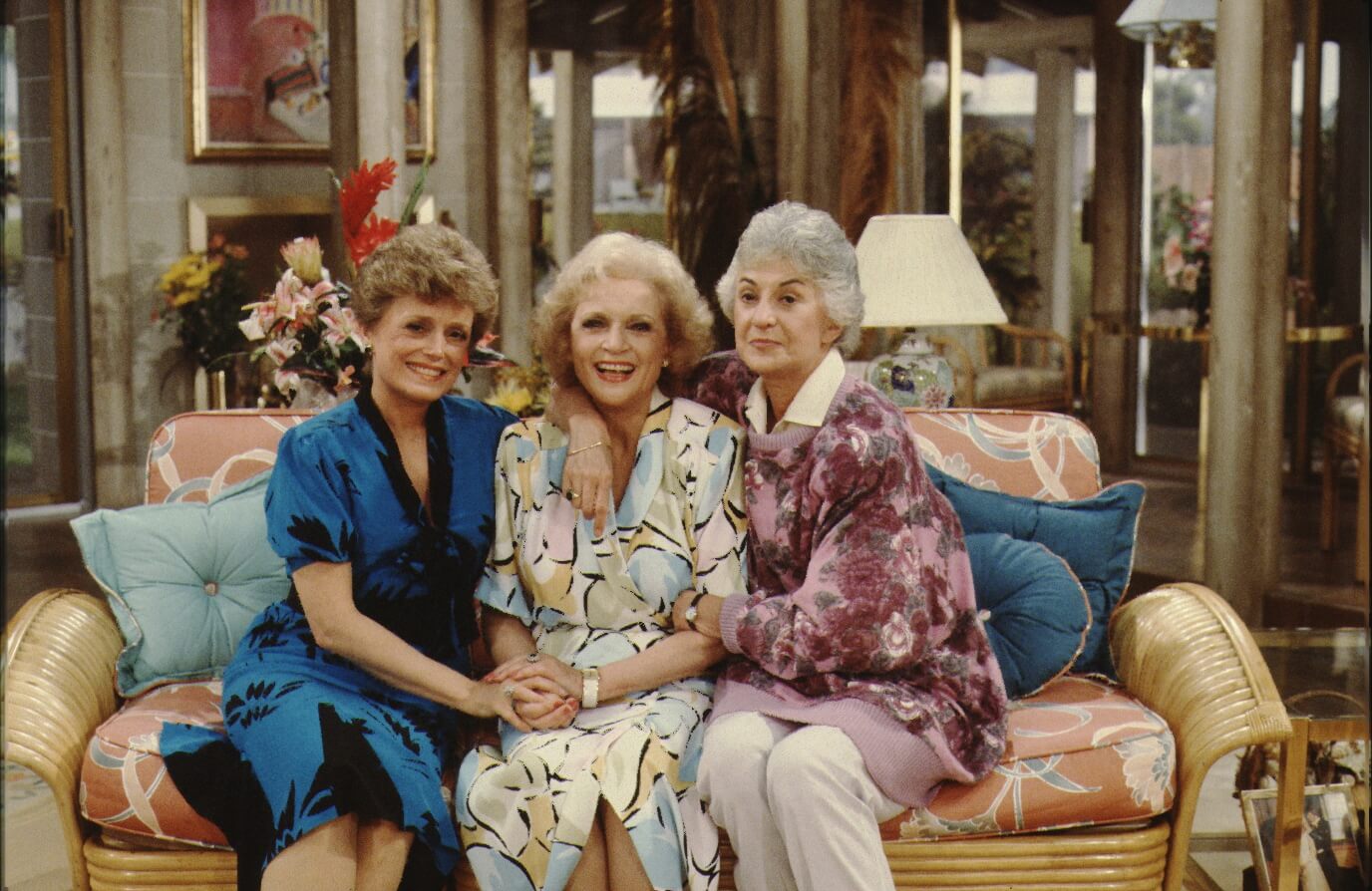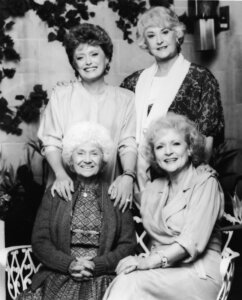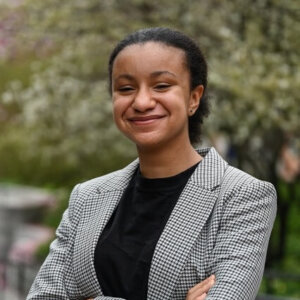Forty years later, we need ‘The Golden Girls’ now more than ever
The hit show’s Jewish soul gave humor and heart to issues other shows refused to touch

Actresses (L-R) Rue Mclanahan, Betty White, and Bea Arthur pose for a portrait on the set of the Golden Girls. Photo by Mark Sennet/Getty Images
For four decades, The Golden Girls has captured the hearts of viewers with the exploits of four older women living in Miami. In Chicago, a group of fans throw an annual Golden-Con, complete with drag shows, trivia, and panel discussions. I myself attended a Golden Girls talk by a local minor league wrestler/college professor at Raleigh, North Carolina’s Galaxy Con a few years ago, with an audience of all races, ages and genders. This Sunday marks 40 years to the day when the first episode aired on NBC.
Stan Zimmerman, who wrote for the show during its first season, told me he knew right away that the show “was very special.”
“Back then television didn’t look like that. There were no old people,” Zimmerman said. “So I was so happy when America caught on to the show and started really appreciating the older demographics.”
Zimmerman had just graduated from NYU when an agent connected him and his long-term writing partner, James Berg, to the Golden Girls producers. What started as just the chance to pitch one episode idea turned into a writing gig for three episodes.
For the past few years, my mom and I have been re-watching the whole series in order, picking up where we left off every time I come home. Despite none of the main characters being Jewish, a Jewish sensibility pervades the show — unsurprising, given that the show runner Susan Harris, two of its stars and many of the writers who came in and out of the show over the years were Jewish.

Sophia and Dorothy, the Italian mother and daughter from Brooklyn, were played by Jewish actresses Estelle Getty (born Estelle Scher) and Bea Arthur (born Bernice Frankel). Even though the characters were explicitly not Jewish, their wit, their strength and their feistiness give off an instantly recognizable Jewish vibe.
“I really do believe that if it wasn’t for anti-Semitism, Sophia and Dorothy would have been Jewish characters,” Zimmerman told me. “Back then it was, you know, can’t have too many Jews on a TV show.”
Another part of the show’s Jewish soul, Zimmerman said, was its use of humor to tackle serious issues. Zimmerman’s episode “Adult Education” deals with sexual harassment. In Season 2, Dorothy, a substitute teacher, tries (and fails) to prevent the deportation of one of her students. A long running storyline concerns Dorothy’s cross-dressing brother Phil. Not every joke from that particular story arc has aged well, but the storyline culminates in a heartfelt, sincere moment that shows empathy towards Phil and upholds his humanity.
“It wasn’t a political show and also it was, because it pushed the boundaries of what’s acceptable to portray, who’s acceptable to portray,” Zimmerman said.
Maybe it was because the show took so many political risks that Jewish main characters would have felt like a step too far in the cultural milieu of the time. Italian characters allowed for a depiction of a distinct ethnic group without disrupting a sense of Christian hegemony. Having Jews play Italians or Italians play Jews is probably one of the most common ethnic interchanges in entertainment (see Jason Biggs in most of his roles, including Orange is the New Black, or Rachel Senott in Shiva Baby), making playing an Italian one of the most Jewish things a Jewish actor can do. And Fran Drescher, best known for playing the very Jewish nanny on The Nanny, had to resist CBS’s attempts to make her character Italian.
Explicitly Jewish plotlines still made their way into the show, however. In one episode, Rose gets over her vanity about dating a person with dwarfism — only to be dumped by him for not being Jewish. Another, a personal favorite of mine, is when Southern-Belle Blanche, who is being inducted into the Daughters of the Old South (a spoof on the real United Daughters of the Confederacy), only to have her entry be threatened by the discovery of Jewish — and worse: Yankee! — ancestry.
This comedy at the expense of Blanche’s obsession with heritage follows another element of Jewish humor Zimmerman saw in the show: “being able to laugh at yourself.” In this instance — and many others in the series — the joke relies on the flaws of the characters themselves. Primarily the show made fun of Blanche’s promiscuity, Rose’s ditsiness, Dorothy’s lackluster love life and Sophia’s bluntness, but sometimes it tackled their small mindedness.
In one episode where Rose is admitted to the hospital, her doctor introduces himself as Dr. Wallerstein. Blanche immediately exclaims, “Oh, Dorothy, she’s going to be alright. Her doctor’s a Jew!” With her signature deadpan glare, Dorothy admonishes Blanche before immediately turning to Wallerstein and suffering a slip of the tongue: “How is she, Doctor Jew?”
But the most notable Jewish moment might be in the third season, when Dorothy stands up against antisemitism. When Dorothy plans to bring Sophie and her date, Murray Gutmann, to her friend’s country club, the friend explains that Jews aren’t allowed.
Dorothy asks how she could belong to such a club, and the friend responds, “Because they serve a great breakfast and the parking is free. Besides, it’s their policy, not mine.”
“Yeah, but you tolerate it,” Dorothy points out. When the friend expresses confusion at Dorothy’s refusal to continue the friendship, Dorothy replies “Let me spell it out for you: Go to hell.”
The Golden Girls is still beloved today thanks to all the ways it broke boundaries on TV. Unfortunately, the show is still as novel as it was when it debuted. Older women are rarely the center of attention on TV and when they are, it is primarily in depictions that bemoan aging as the end of fun: the end of a social life, the end of mobility and freedom, the end of sex. The four women showed that there’s no reason for aging to prevent you from participating in a danceathon, stealing the Pope’s ring, or going to a nudist resort. One of the rare modern day shows to embrace aging has been Netflix’s Grace and Frankie, which also features a Jewish star, and actually has Jewish main characters.
And it’s still unique in its depiction of social issues. Deportation, sexual harassment, and queerness are still seen as sensitive subjects to discuss on TV. When shows do approach them, it’s often with the cadence of an after school special, a patronizing finger wave and a message about how we all need to hold hands and sing kumbaya. It’s refreshing to go back to The Golden Girls and see a character tell a bigot exactly where they can go.

















